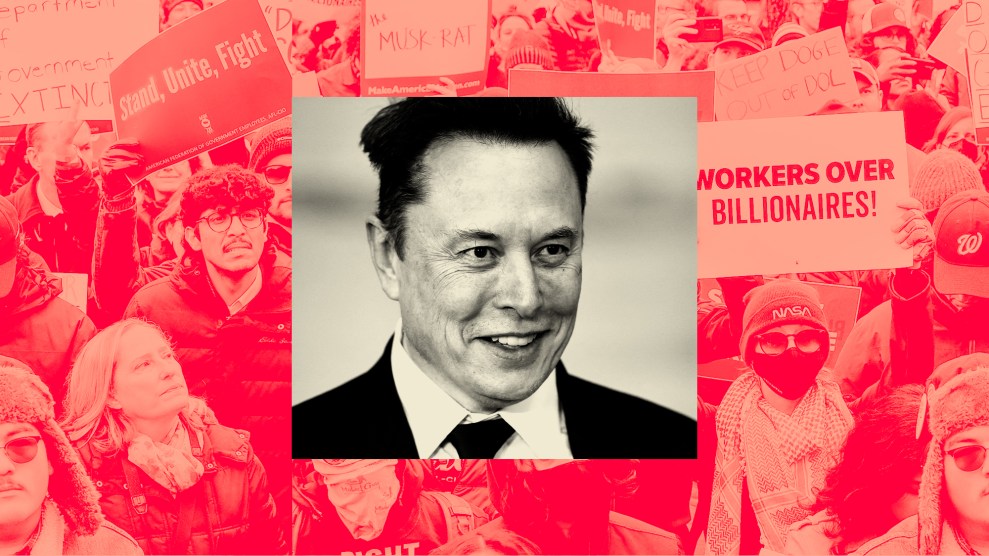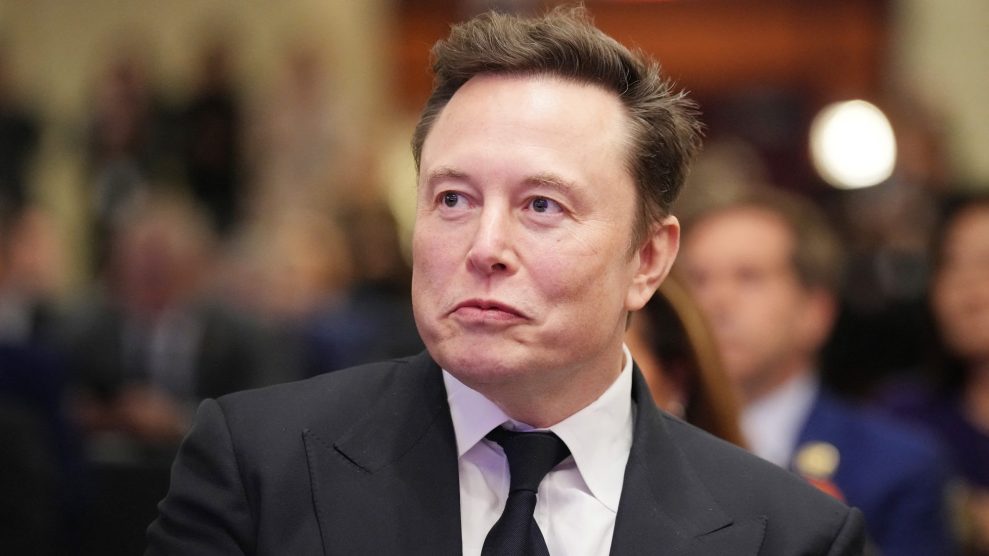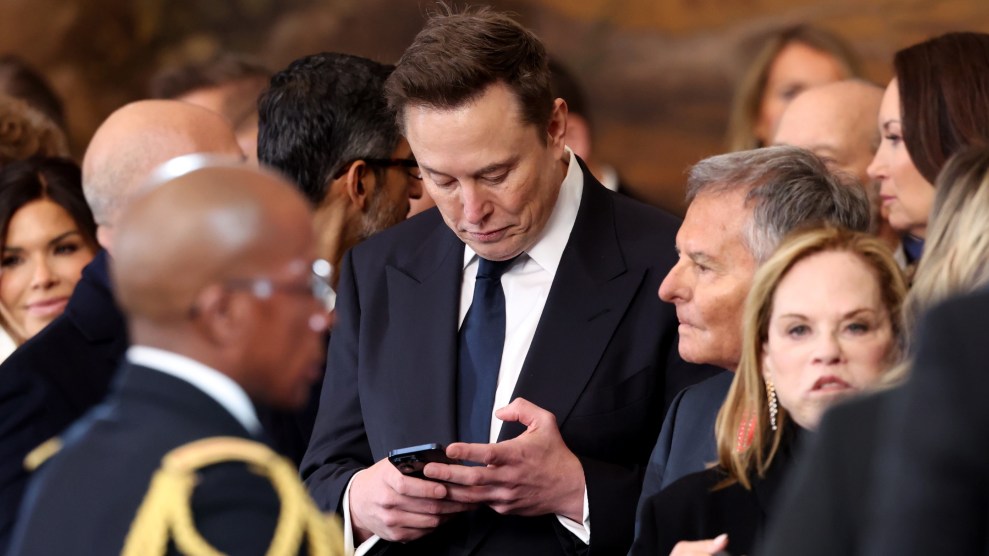
Mother Jones illustration; Pool/Abaca/Zuma; Michael A. McCoy for The Washington Post/Getty
For some, the chaos wrought by Elon Musk and his ironically-named Department of Government Efficiency feels strangely familiar.
Mysterious outside consultants roaming the halls? The kind who appear to know nothing about the business they’re supposedly auditing for efficiency? Who push cuts into what they presume is fat, but is actually muscle, connective tissue, and Medicaid?
The whole thing smells a lot like private equity.
“They don’t know anything but are acting like they know everything.”
Several DOGE figures have experience doing this kind of thing before: Tom Krause, a Silicon Valley executive linked to the project, presided over a brutal round of private-equity backed cuts at Citrix, a cloud computing company. And while Musk and DOGE mostly aren’t directly representative of the industry that looted America, a lot of their tactics are deeply familiar to anyone whose workplace has been devoured by a private equity firm. Even the stated goals are the same: at their core, private equity firms buy supposedly failing businesses and promise to flip them for a profit. But many of the businesses they buy, from toy stores to hospitals to real estate companies, end up going bankrupt; some sources estimate that businesses that are part of a private equity portfolio are ten times as likely to file for bankruptcy protection as those who aren’t.
Having worked at Gizmodo Media Group when it was bought by the private equity firm Great Hill Partners, I recognize some of the dynamics and tactics now playing out across the federal workforce. To explain it all, I reached out to another GMG alum, Megan Greenwell, whose forthcoming book, Bad Company, explores how private equity has reshaped American industry. Greenwell and I talked about how DOGE tactics resemble those of private equity firms, and what federal workers and the American public can learn from how the stories of PE-owned companies have played out.
Our conversation has been lightly edited for length and clarity.
This feeling right now, of things falling apart in weird ways, is very familiar to those of us who have had private equity buy our workplaces. What tends to happen when private equity comes in? Are there stages or a pattern?
It depends a lot from industry to industry. One early sign that feels very familiar to me in the federal government, is random people you have never seen before just start walking around your office and asking the dumbest questions possible. In most offices, they’re not like 17-to-20 year olds, like they seem to be in the federal government, but that feeling of “What are all these strangers doing? How come they don’t know anything but are acting like they know everything?” is a very common first step.
Another one is that things just tend to stop working. When we worked together at the former Gizmodo Media Group, they pretty quickly stopped quality assurance measures, like technical stuff to make sure that the website worked. So the website started breaking all the time. That also feels very familiar here. A lot of stuff is breaking because they’re really breaking it out of malice. But some stuff they’re like, ‘Oh shit, we probably shouldn’t have broken that one,’ right?
There is no systemic thinking. There is no larger plan. They’re just randomly punching buttons to find out what does what and then only realizing the ramifications once things break. So those are two very early ones. That’s day one stuff. Welcome, federal government employees.
What do workers at private equity-bought companies tend to experience?
Budget cuts are the biggest thing. The idea that someone like Elon Musk knows better than people who have worked in this world for decades and decades about what you should be spending money on and what you shouldn’t, that is so common. It’s very common to see severe budget cuts including serious, serious layoffs immediately. If there are not huge layoffs immediately, they’re probably coming later. The budget cuts that do go through are the types of things that are, again, going to break systems and make things work a lot less well.
A classic example is Toys R Us, which I write about in the book. They actually didn’t have that many layoffs for the first few years. They closed some underperforming stores, but it wasn’t a huge focus. But they didn’t have enough money to spend on upgrades, because they had taken out so many loans that all of the company’s earnings were going to debt payments. These things were actively making the company worse because they weren’t spending money on them.
For example, Toys R Us had had this vaunted money back warranty program which they replaced that with something much, much worse. Obviously customers are furious, and when customers are furious, they call the stores to complain. They don’t know how to reach the private equity executives in charge. The only people to complain to are these workers, so the workers’ satisfaction is going way down. The in-store experience was getting worse and worse and worse, which meant that they were selling less, which was ostensibly the goal of the company.
Budget cuts are sometimes necessary. But in a lot of cases, they really are just shooting you in the foot because they’re undermining your ability to do the basics of the job. Budget cutting that feels nonsensical and is not based in research and not based in what’s actually making you money is super common.
What have you learned from your research that could be helpful for folks going through this on a worker level?
Had I known what I know now, I would have quit working for Gizmodo Media Group on day one. So part of me is tempted to say, you just gotta quit. On the other hand, many people who work in the federal government are so mission-driven, right? I really loved my job, but it was not the only thing I could ever see myself doing—whereas a lot of career federal government employees, they’re really coming at it from a perspective of, ‘I have bought into this work at a deep level, and I never want to do anything else.’ For those kinds of people, it does feel kind of glib to say quit day one—and listen, as a citizen of this country, I would strongly prefer some reasonable people stuck around. It’s gonna suck a lot, but if you have it in you to fight, great! Please fight. Do what you can to undermine and obfuscate and allow the good work to keep going on.
One of the things I’ve really admired about several of the characters in my book is that they fought. I would not say in any of the primary cases they won—it’s not like they single-handedly took down their private equity company. These folks in the federal government are probably not going to single-handedly take down Elon Musk. But we’ve seen judges say, ‘No, actually you can’t do this,’ and that’s going to keep happening.
Some of these people might have legal protections as civil servants that we certainly didn’t have as bloggers.
Totally. And more investment too, right? We were small in the grand scheme of things. The federal government is not small, and so even individual stories tell a much larger tale and matter in a way that like Deadspin dying didn’t—as much as I loved them.
It didn’t have the same impact on the entire world like the EPA ceasing to function will.
Right. You know, one thing about private equity is they do really operate in the shadows. That is what they like. That is how they get away with so much. You can’t do that when you’re the federal government, as we’ve seen. There’s going to be a spotlight on absolutely everything. I think anybody who’s worked for a private equity-owned company would tell you if there had been a spotlight, a lot of things would have felt very different.
Why does this feel so familiar? Why does this feel so much like private equity?
One of the big things is being unable to tease out what is malice and what is just sheer incompetence. This woman I’m writing about at Toys R Us, she was a normal store worker. She was like, ‘OK, the only things you have to do to keep this store running are like X, Y, and Z. So why are you breaking X, Y and Z? It really makes you feel crazy. You feel like, ‘Am I an idiot? The things I know that work, they don’t actually work?’
That feels really familiar—these 19 year olds walking around ruining everything and you can’t exactly figure out why. Like, yes, of course they’re shutting off AIDS medications in Africa because they have determined those lives are not worthy or whatever.
But there are other things where it’s like, you can’t kill all of the things that affect all of your voters, right? Medicaid is really, really, really popular. In that case, it does feel like they’re breaking it because they’re too stupid not to rather than because they’re trying to alienate everybody in the country.
That feeling of what is up and what is down, and what is malice and what is incompetence, is super, super haunting to me.
What is the terminal stage of a private equity owned company?
Unfortunately, in a disproportionate number of the cases, the company does no longer exist but the private equity fund makes a ton of money. Hopefully that will not be true with the US government. Although, let’s see.
Let’s see!
It also just results in a lot of people having measurably worse lives, and that is clearly going to be an outcome here. There’s a character in my book whose private equity landlord evicted her purely out of spite, because they did not like the way she was speaking to them when they were being real assholes. There’s another story in my book about this rural hospital where services were stripped and you can’t get basic medical treatment—you’re looking at going 30 or 40 miles in any sort of emergency. Almost always, everything gets worse up to the point of shutting down.
Well, Megan, in my opinion, that shouldn’t be legal. What do you think?
Right. I don’t think it should be legal. With the federal government stuff, it seems like at least some of it certainly isn’t legal, and we just have to wait for the court system to catch up with the 19 year olds.
They’re very spry.
Yeah, they have endless energy, I guess, with all the Red Bulls.
Something like that.
You know, the reason it’s legal in private equity is because the industry has spent so much money in Washington making sure it’s so. Do you want to know the number of senators and Congress members that get no private equity money?
No.
It’s 12 percent. So 88 percent of people on the Hill in both parties took some private equity industry money in the last cycle. This is a pretty universal problem. I got some questions when Trump was first elected about how much worse is it gonna be now—and honestly I’m not sure it’s actually gonna be much worse. Everything else is, but I didn’t see a lot of prospect for more private equity regulation under a Kamala Harris administration either, frankly.
There are certainly attempts to make maybe not the entire industry illegal, but the worst parts of it illegal. Elizabeth Warren has valiantly proposed this Stop Wall Street Looting Act several times and it just never goes anywhere.
So yeah, that’s why it’s legal. Will it ever be illegal? I certainly hope so, but it is going to take a pretty dramatic change in who is representing us.
Bad Company is set to be released on June 10.
















